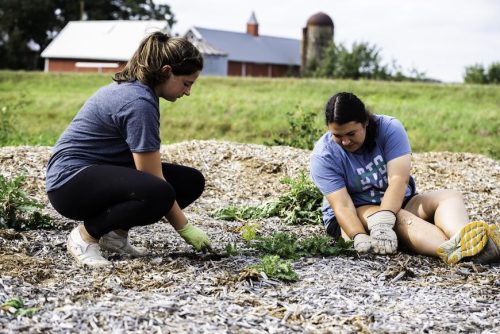On a warm weekend in mid-September, several students from St. John’s University in Collegeville and the College of St. Benedict in St. Joseph traded in their books, dorm rooms and their usual campus activities for chickens, kombucha and farm life as they traveled to southeastern Minnesota to visit the Lake City Catholic Worker Farm.
The students were there attending the SJU-sponsored PIG — Prayer in the Garden — retreat. They worked on the farm, helped sell kombucha and learned from Paul and Sara Freid, the farm’s founders, along the way.
“I think it’s unique to see work and prayer together,” said Courtney Huiras, a second-year theology major who attended the PIG retreat. “Working has been good. It’s been hard, but it just adds appreciation to what they do here.”

The Lake City Catholic Worker Farm is a community farm rooted in the Catholic Worker Movement and is located just minutes from downtown Lake City on the shores of Lake Pepin.
The Catholic Worker Movement, founded in 1933 by Dorothy Day and Peter Maurin, is characterized by a call to “nonviolence, voluntary poverty, and the works of mercy as a way of life” and includes establishing houses of hospitality.
As part of the Catholic Worker Movement, Peter Maurin also envisioned establishing farming communities, of which the Lake City Farm takes its inspiration.
Paul and Sara originally purchased the land in 2007 to begin a beverage business after having worked at the Catholic Worker house in Winona.
“We were looking for ways to support ourselves, and so one person thought we should do Communion wine and that really stuck with us. We started to work more with the land and look at creation and how we’re supposed to be integrated with creation and collaborate as co-creators,” Paul said.
On their farm today, Paul and Sara raise animals and produce, make and sell kombucha (a tea beverage), offer hospitality and raise their own three children there as well.
Paul said it is in their farm work that they feel their “realm of influence.”
“We’re Catholic workers and part of that Catholic Worker Movement is that farming aspect. That’s where we feel that the Holy Spirit’s calling us to be active in,” he said.
The Freid’s Catholic Worker roots are evident in their care and passion for the land and for others. Sara said it is important to live sustainably, intentionally and “based on values that uphold community and human dignity.”
“The land is not ours. … We don’t own the land. We are blessed to be here. But it’s not ours, so we need to treat it in a way that it will be here for generations to come,” she said.

In addition to their work with the land, the Freids also offer hospitality, something Paul said is “core” to their family. They host a number of different groups and people at their farm, including college students, middle-schoolers, church groups and those experiencing homelessness.
“We welcome lots of folks for lots of different reasons. People really gravitate to this idea of people who don’t have a place to stay [being able to live] here,” Paul said.
Everyone who visits is “incorporated in some way into the farm,” Paul said.
For the St. John’s and St. Ben’s students on retreat, it involved weeding, planting trees and helping with the kombucha stand.
Keilan McSweeney, a third-year economics student attending the retreat, said that his experience of working on the farm was “very humbling.”
“It reminds us that God created all of us, and he created all of the plants and all the animals that we should take care of,” he said.
One aspect of Paul and Sara’s work and mission is their emphasis on creating “a more just view of the land.” Paul mentioned how colonialism, through which land is extracted from its native people, has affected the land use.
“We happen to be on this land through an unjust system, so if we can somehow try to … peel back those layers and try to work towards a more just system. … Where does God want us to use that land? Not to extract but to co-collaborate, co-create,” he said.
Paul and Sara also work to create a “socially just business,” an aspect that makes them unique from many other farming communities. Paul said they only use local products or organic products made in the United States. If they buy internationally, the products must be fair-trade certified.
“We are slowly trying to create this business, letting the Spirit lead us in this business in a way that is not extractive of communities in other places but instead lifts them up.”
And it is in that vision of a socially just business “from top to bottom,” in which Paul said the Church encourages Catholics to run, that is the core of what the couple seeks to do.
“We do hospitality, we work together, and we have this economic vision that we feel like the Holy Spirit is calling us too, and so that’s exciting for us, because that allows us to listen to the Spirit, but also to invite people into that relationship even more,” Paul said.





















